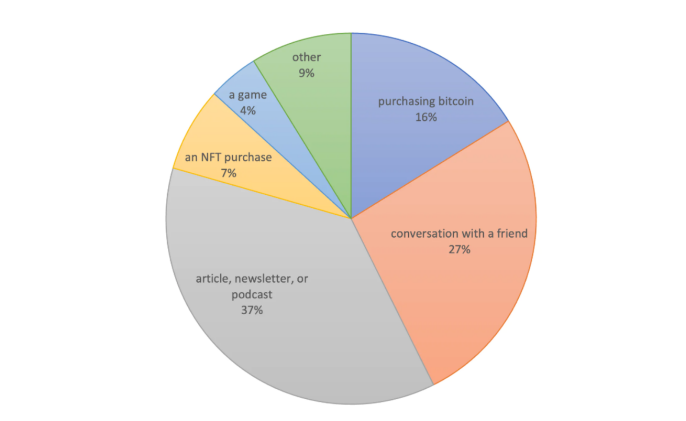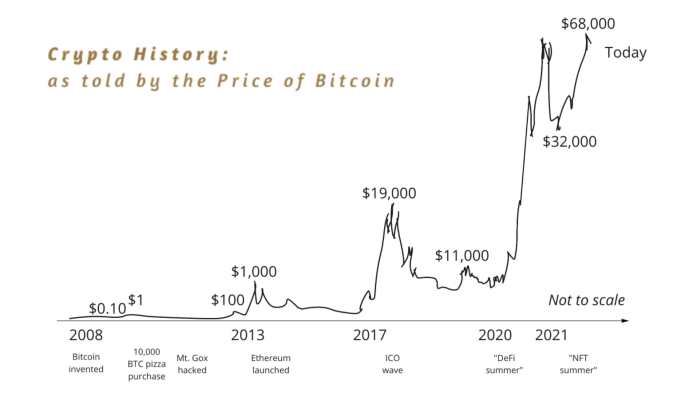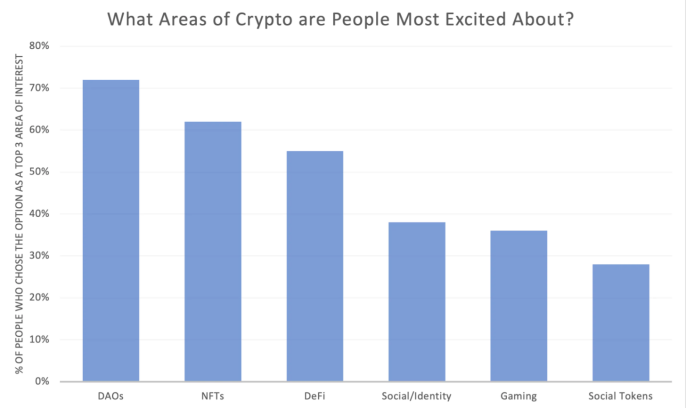Original title: "Investigation丨Insiders jump into the Web3 "rabbit hole" incentives and those "epiphany" moments"
Compilation of the original text: The Way of the Metaverse
Compilation of the original text: The Way of the Metaverse
A few weeks ago, I asked people to share their journey into web3. The key question I want to answer is - what is attracting the masses to web3?
To gain insight into this question, I wanted to look specifically at why people are getting into web3 so far, what areas people are most interested in, and what people think is the biggest challenge in this area.
first level title
1
What got people interested in crypto/web3 in the first place?

The top 3 things that initially pulled people into crypto/web3 were:
1. An article, newsletter, or podcast: Whether it's entering a Mirror writing contest, reading Not Boring, or listening to the Bankless podcast, many respondents noted the impact of good content. In that spirit, I want to share 3 of my favorite articles:
Web3 101: The fundamentals of Web3 and how it differs from Web2
Against Scarcity: A Discussion"How to define economic value in a post-scarcity digital world"The problem
A Beginner's Guide to Social Tokens, DAOs, and NFTs
2. Conversations with friends: friendlier = less intimidating
Encryption/web3 can be confusing and obscure (more on that later). The voice of someone you trust (like a friend) is often the easiest way for people to get into the space (that's how I got into the space!).
3. Buy Bitcoin: Get in
If you hear anyone talk about cryptocurrencies, chances are you've heard some form of"or"or"If I buy more DOGE in 2016..."While there are some glamorous elements driving the increased attention around web3 - such as blockchain's permissionless nature and potential for community governance - it's clear that the desire (and track record!) for financial gain is the domain's A key feature of (see image below by Laura Du).

While it may be tempting to imagine a society driven purely by idealistic values, we shouldn't lose sight of the more obvious truth: economic incentives are the main engine driving web3. However, while financial incentives are often what bring people into the space, social incentives such as community, friendship, and influence can be what keep them. As David Phelps stated, the optimal level of economic incentives may be"text"
which"epiphany"Time to get people further down the web3 rabbit hole? (That is, what led them to get involved in something other than buying BTC or ETH?)
Here are 6 use cases/aspects of web3 that are generating the most excitement:
Monetization of creators
"Royal.io/Impact on the Music Industry"
"Build a global community of artists around a social token"
"cutting edge"
as"cutting edge"web3
"Just don't know enough - everyone is still in the process of discovery, and that's what drives me to learn more"
"If this is the reinvention of the internet, I want to be a part of it"
Openness and Composability of Blockchain
From a developer's point of view:"The biggest thing was doing the CryptoZombies solidity tutorial and realizing that all contracts and data are open to view and interact with."
"As someone who has worked with traditional cloud service providers, my head was blown the moment I realized that people could build applications without any web2 infrastructure and deploy them to Ethereum."
NFTs and Ownership
"Buy an NFT and join a discord with barriers... Potential for new social experiences"
"When I started following RFTKT and realized that NFTs are not just art - they have real utility and are the foundation of an interoperable metaverse. Seeing that the RTFKT sneaker could be worn on Snapchat via AR, or in Decentraland or in a game was eye-opening."
"Community"
Community
"Being an entrepreneur is lonely. Discover a community where I can contribute value in any way and get rewarded with emoji and crypto!"
financial gain
"In 2017, as a gift from Secret Santa, I got some ETH and the corresponding private key, worth $10 at the time. In 2021, I put it in my wallet with my private key and it became $306 in ETH."
"When I made $2K from Ethereum in a few weeks lolz"
2
image description

most
most"popular"The categories, in order, are:
DAO (chosen by 72% of respondents)
NFTs ( 62% )
DeFi ( 55% )
social token
game
social token
Finally, and arguably one of the most important questions...
3
What do people think is the biggest challenge for encryption/web3?
The two biggest challenges are: 1) how to "get on board" and 2) regulations
How to "get in the car"
It's no secret that the crypto world can be messy, obscure, and scary. There are three aspects of the "onboarding" process that are key to making getting people into web3 more enjoyable.
1. AccessibilityUser experience: Centralized exchanges like Coinbase and Gemini and Defi apps like Blockfi and Donut have friendly user interfaces that abstract away a lot of technical complexity for the average consumer. But more encrypted/Web3 applications are very difficult to use for the average consumer. I still remember the confusion when I first used Metamask. I don't know how to send money from my centralized exchange account to my Metamask, no idea"or"or"reject"What does a transaction mean and why the cost is so high (gas fee!).
Gas Fees: Many web3 activities are costly. Buying cryptocurrencies or purchasing NFTs is simply not possible for many people. Even for those with the financial means to participate, cost is a huge disincentive.

ordinary"ordinary"For consumers, the three key questions are: 1) what happened, 2) why should I care, and what would happen if I cared, and 3) how can I participate (in a safe way)?
Content can be a way to educate people and address these issues. Events and experiences (both IRL and virtual) can also be important ways to explore these questions. regardless"educate"Regardless of the format, it needs to be high-quality, discoverable, digestible, and actionable.
Tribute to those working in education: Crypto, Culture, & Society, Buildspace, Rabbithole, Coinvise, Peter Yang's Odyssey, Chase Chapman's On the Other Side, Kinjal's Two Cents
However, the criteria for effective content is only relevant to those who are at least interested in learning. Also key is what gets more people interested in crypto/web3. Part of the answer is the narrative around crypto/web3 (created and told by journalists, celebrities/influencers, politicians, etc.).
The narrative surrounding crypto/web3 ranges from skeptics who worry that cryptocurrencies are one big Ponzi scheme to proponents who argue that cryptocurrencies are the future of the internet. Unfortunately, as we see in American politics today, the dialogue between these opposing views is often a shouting contest rather than an open dialogue.
However, for web3 enthusiasts who want others to join the space, attacking the views of skeptics is counterproductive, as it will only make skeptics feel more disgusted with the space. For skeptics, the most effective way to express concerns and ask important questions about the domain is to do so in a friendly rather than hostile way (Reboot is a good example, see David).
3. Diversity and inclusionGiven the early days of the field, there are (conceivably) real opportunities to build a diverse and inclusive ecosystem. Additionally, given that many events are online by default, there is an opportunity for truly global collaborations. The ability to remain anonymous also means that people can learn more about their behavior, rather than being judged by their appearance/age/gender/etc. Of course, anonymity also creates opportunities for bad actors, who can lie about their identities for dishonorable purposes.
In this space, there is some discussion about diversity and inclusion, but these topics still make up a relatively small share of thought. However, it is especially important that we focus on diversity and inclusion early on, because the effects of doing so (or not) can be compounded over time. That said, people tend to attract similar people, so the longer you wait to diversify, the harder it will be to do so.
Supervision
4
Supervision
This topic could be an article in itself, so I'll keep this high (if a longer article on this topic would be of interest, please let me know!)
Different governments hold very different views on cryptocurrencies. El Salvador has approved Bitcoin (BTC) as legal tender, China has banned cryptocurrencies and mining, India reversed its cryptocurrency ban in 2020, and there are many more countries whose positions are still undecided.
Given the layers involved, there are many layers of complexity: different governments, political and economic models, domains of web3, levels of consumer adoption, etc. Much of the government regulation to date has focused on regulating cryptocurrency exchanges and taxation issues, while the likes of NFTs and DAOs"newer"There are still some issues with areas such as fraud protection and security.
Domestically, there is no clear regulatory framework."The Securities and Exchange Commission (SEC) generally considers cryptocurrencies a security, while the Commodity Futures Trading Commission (CFTC) calls Bitcoin (BTCUSD) a commodity and the Treasury Department calls it a currency"(Investopedia). While Federal Reserve Chairman Jerome Powell has stated that the U.S. does not intend to ban cryptocurrencies, some state governments have passed laws regarding cryptocurrencies and blockchain technology.
Additionally, there are other challenges that don't fall into the two categories of "onboarding" and regulation, including the balance between decentralization and centralization, the environmental impact of mining and powering the blockchain, and clarity around wallet security And the lack of education and how to take care of your mental health in a 24/7 space.
Finally, there are philosophical questions that remain unanswered -- for example, how does the government regulate people or groups of people who don't have an ultimate"Responsible"entities, how the government regulates activities without borders, and how to regulate (though originally created by individuals) permanently enforced by smart contracts"independent"text
Brief summary:
The top 3 things that attract people into crypto/web3 are the 3Cs: Content, Conversations with friends, and purchases in Cryptocurrency (usually BTC).
People are most interested in 6 aspects of web3: monetization of creators, early nature of the space, blockchain openness and composability, NFTs and ownership, community, and economic gain.
The top 3 categories people are most bullish on are: DAOs, NFTs, and DeFi.
Two of the biggest challenges in the field are “onboarding” (improving access, creating learning opportunities, and promoting diversity and inclusion) and regulation.
We are still very early in this field, which means there are many open questions and challenges, and just as many opportunities. It is my hope that we can continue to make this space more accessible and embody the values we want to foster in this fast-paced and often speculative environment.
Thanks to all survey respondents who shared their views and to those who helped share the original survey. If you are building in this space please contact us! Working towards making crypto/web3 more accessible to all #wagmi
Special thanks to Kinjal Shah, Jerry Feng, Laura Du, and David Phelps for their valuable feedback.
*This survey was shared and promoted via twitter - on accounts of myself and friends in the space - as well as the Accelerated newsletter and two discussion groups I participated in - tribute to Pixelbeasts and Chainforest. As such, it's heavily skewed toward people working in tech and/or web3, and probably a third degree connection to me.